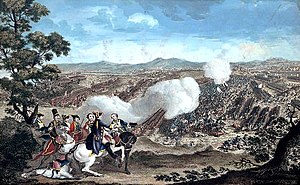
Back Schlacht bei Minden German Batalla de Minden Spanish Bataille de Minden (1759) French Battaglia di Minden Italian ミンデンの戦い Japanese 민덴 전투 Korean Slag bij Minden Dutch Slaget ved Minden NN Slaget ved Minden NB Bitwa pod Minden Polish
You can help expand this article with text translated from the corresponding article in German. (March 2022) Click [show] for important translation instructions.
|
| Battle of Minden | |||||||
|---|---|---|---|---|---|---|---|
| Part of the Seven Years' War | |||||||
 The Battle of Minden, unknown painter | |||||||
| |||||||
| Belligerents | |||||||
|
Brunswick-Wolfenbüttel |
| ||||||
| Commanders and leaders | |||||||
|
|
| ||||||
| Strength | |||||||
| 37,000[1] | 44,000[1] | ||||||
| Casualties and losses | |||||||
| 2,762 killed, wounded or missing[2] | 7,000 killed, wounded or missing[2] | ||||||
The Battle of Minden was a major engagement during the Seven Years' War, fought on 1 August 1759. An Anglo-German army under the overall command of Prussian Field Marshal Ferdinand of Brunswick defeated a French army commanded by Marshal of France, Marquis de Contades. Two years previously, the French had launched a successful invasion of Hanover and attempted to impose an unpopular treaty of peace upon the allied nations of Britain, Hanover and Prussia. After a Prussian victory at Rossbach, and under pressure from Frederick the Great and William Pitt, King George II disavowed the treaty. In 1758, the allies launched a counter-offensive against the French and Saxon forces and drove them back across the Rhine.
After the allies failed to defeat the French before reinforcements swelled their retreating army, the French launched a fresh offensive, capturing the fortress of Minden on 10 July. Believing Ferdinand's forces to be over-extended, Contades abandoned his strong positions around the Weser and advanced to meet the Allied forces in battle. The decisive action of the battle came when six regiments of British and two of Hanoverian infantry, in line formation, repelled repeated French cavalry attacks, contrary to all fears that the regiments would be broken. The Allied line advanced in the wake of the failed cavalry attack, sending the French army reeling from the field, ending all French designs upon Hanover for the remainder of the year.
In Britain, the victory is celebrated as contributing to the Annus Mirabilis of 1759.